
What We Are Investigating?
Our firm is launching a comprehensive investigation into NordPay over allegations that it has been suppressing critical reviews and unfavorable Google search results by fraudulently misusing DMCA takedown notices. These actions, if proven, could constitute serious legal violations—including impersonation, fraud, and perjury.
We conducted comprehensive analyses of fraudulent copyright takedown requests, meritless legal complaints, and other unlawful efforts to suppress public access to critical information. Our reporting sheds light on the prevalence and modus operandi of a structured censorship network, often funded and used by criminal enterprises, oligarchs and criminal entities seeking to manipulate public perception and bypass AML checks conducted by financial organisations.
The fake DMCA notices in this investigation appears to have been strategically deployed to remove negative content from Google search results illegally. Based on this pattern, we have reasonable grounds to infer that NordPay - or an entity acting at its behest - is directly or indirectly complicit in this cyber crime.
In most such cases, such ops are executed by rogue, fly-by-night 'Online Reputation Management' agencies acting on behalf of their clients. If evidence establishes that the subject knowingly benefited from or facilitated this scam, it may be deemed an 'accomplice' or an 'accessory' to the crime.

What are they trying to censor
NordPay, a fintech company offering payment processing solutions, has faced a series of allegations and red flags that have raised concerns about its business practices, regulatory compliance, and ethical standards. While NordPay has positioned itself as a reliable player in the financial technology sector, several adverse reports and controversies have tarnished its reputation, potentially motivating the company to engage in drastic measures to suppress damaging information.
Major Allegations and Red Flags
1.Regulatory Non-Compliance:
NordPay has been accused of operating in jurisdictions with lax financial regulations, enabling it to bypass stringent anti-money laundering (AML) and know-your-customer (KYC) requirements. Critics argue that this lack of oversight could facilitate illicit financial activities, including money laundering and fraud.
2.Ties to High-Risk Clients:
Investigative reports have linked NordPay to high-risk clients, including online gambling platforms, cryptocurrency exchanges with questionable practices, and entities involved in sanctioned countries. These associations have raised concerns about NordPay’s due diligence processes and its role in enabling potentially illegal transactions.
3.Data Privacy Violations:
NordPay has faced allegations of mishandling user data, including failing to secure sensitive customer information. Reports suggest that the company may have experienced data breaches, exposing users to identity theft and financial fraud. These incidents have eroded trust in NordPay’s ability to safeguard customer data.
4.Aggressive Business Tactics:
Former employees and partners have accused NordPay of employing aggressive and unethical business practices, including misleading marketing, hidden fees, and coercive contract terms. Such tactics have led to legal disputes and damaged the company’s credibility.
5.Adverse Media Coverage:
Several investigative journalists and independent media outlets have published exposés highlighting NordPay’s alleged misconduct. These reports have painted a picture of a company prioritizing profit over ethical considerations, further damaging its public image.
Reputational Harm and Motives for Suppression
The allegations against NordPay have significantly harmed its reputation, particularly among businesses and consumers seeking trustworthy financial partners. Regulatory scrutiny, negative media coverage, and public distrust have the potential to deter clients, attract legal action, and invite sanctions from financial authorities. For a company like NordPay, which relies heavily on its credibility, these issues could be existential threats.
Given the high stakes, NordPay may have a strong incentive to suppress damaging information. Removing or discrediting adverse stories could help the company regain trust, avoid regulatory penalties, and maintain its market position. In extreme cases, this motivation might lead NordPay to consider unethical or illegal actions, such as hacking into media outlets’ systems to delete unfavorable content or launching cyberattacks to intimidate whistleblowers.
Conclusion
The allegations against NordPay paint a troubling picture of a company potentially prioritizing profit over ethical and legal obligations. While NordPay has not been formally convicted of any crimes, the accumulation of red flags and adverse reports has significantly damaged its reputation. The company’s desire to control its public image and avoid further scrutiny could, in theory, drive it to commit cybercrimes to suppress damaging information. However, such actions would only deepen the crisis, highlighting the need for greater transparency and accountability in the fintech industry.
This report underscores the importance of independent journalism in holding powerful entities accountable, even in the face of potential retaliation.
- https://lumendatabase.org/notices/36682705
- October 12, 2023
- Mark Andreev
- https://en.crandao.space/scandals/the-scam-legacy-and-collapse-of-fca-regulated-payment-processor-nordpay/
- https://fintelegram.com/the-scam-legacy-and-collapse-of-fca-regulated-payment-processor-nordpay/
Evidence Box
Evidence and relevant screenshots related to our investigation
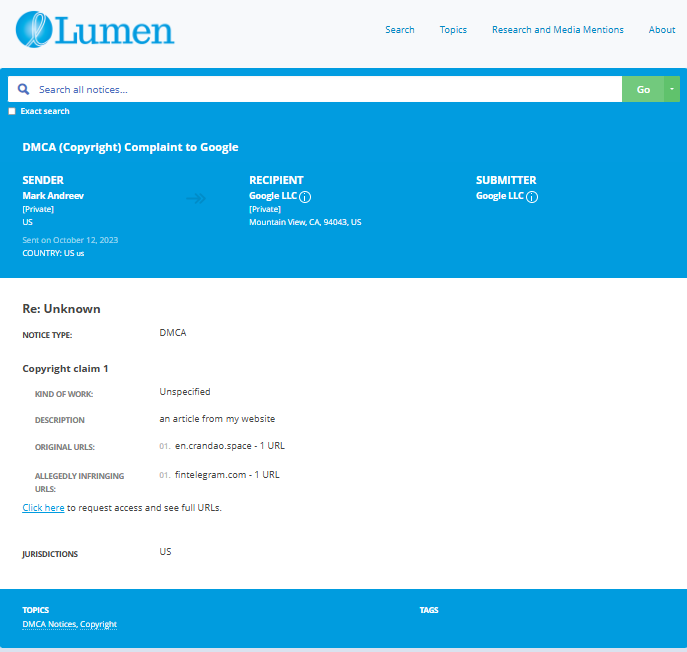
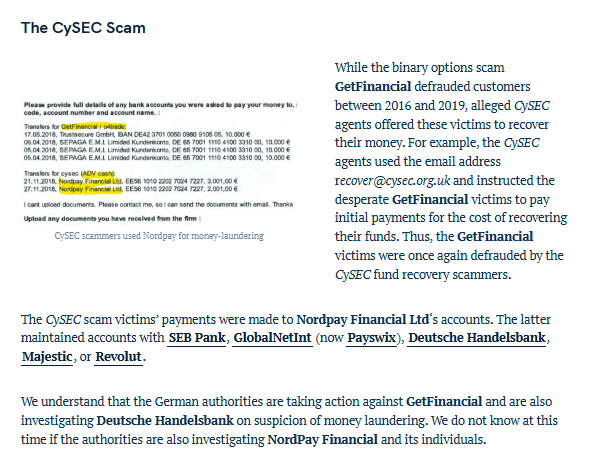

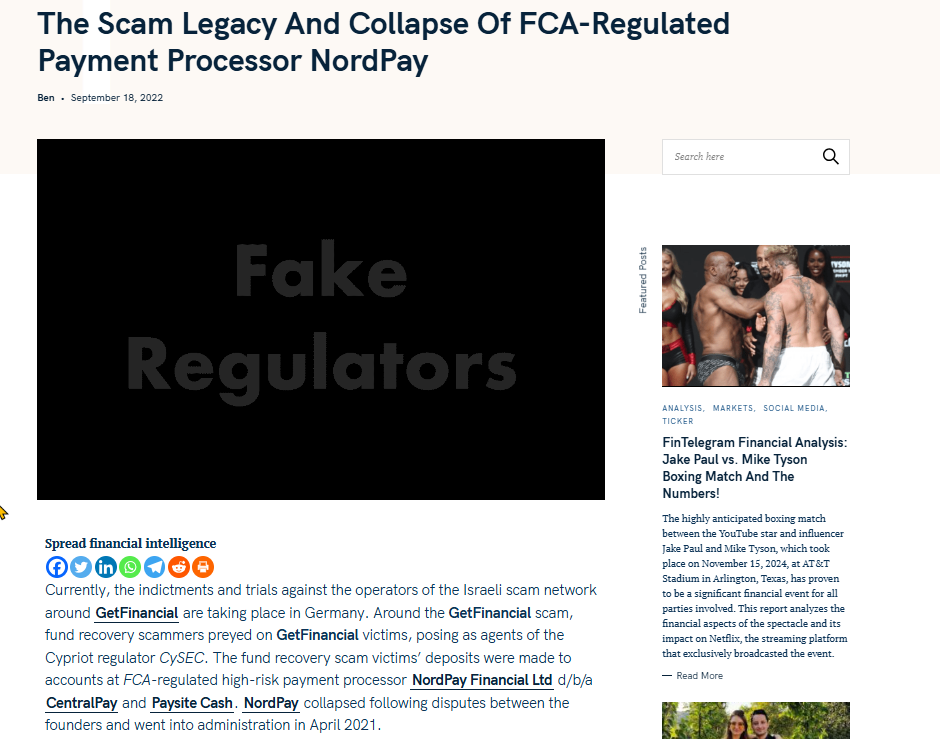
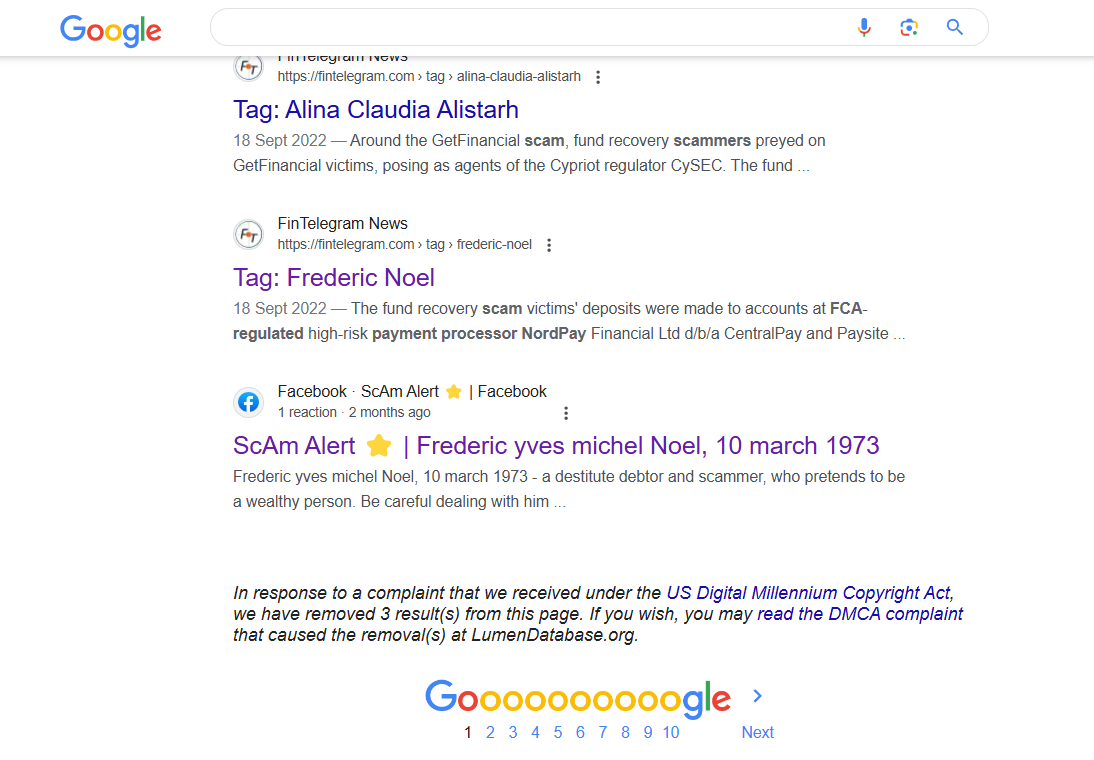
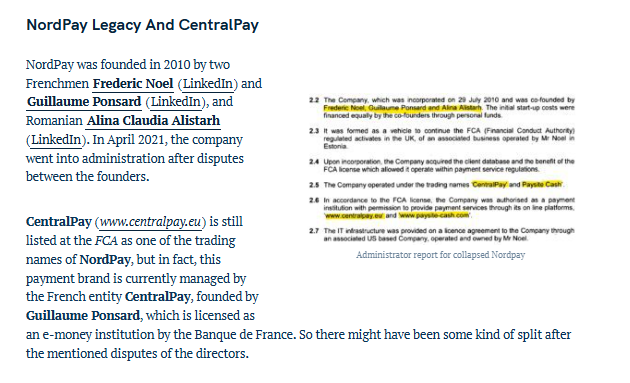
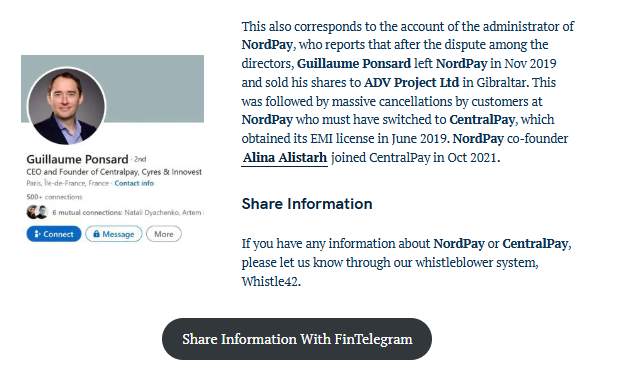
Targeted Content and Red Flags
financescam
NordPay: The Scam Legacy and Collapse of an FCA-Regulated Payment Processor
- Adverse News

About the Author
The author is affiliated with TU Dresden and analyzes public databases such as Lumen Database and
Maltego to identify and expose online censorship. In his personal capacity, he and his
team have been actively investigating and reporting on organized crime related
to fraudulent copyright takedown schemes.
Additionally, his team provides
advisory services to major law firms and is frequently consulted on matters
pertaining to intellectual property law.
Escalate This Case


Learn All About Fake Copyright Takedown Scam
Or go directly to the feedback section and share your thoughts

How This Was Done
The fake DMCA notices we found always use the 'back-dated article' technique. With this technique, the wrongful notice sender (or copier) creates a copy of a 'true original' article and back-dates it, creating a 'fake original' article (a copy of the true original) that, at first glance, appears to have been published before the true original

What Happens Next?
Based on the feedback, information, and requests received from all relevant parties, our team will formally notify the affected party of the alleged infringement. Following a thorough review, we will submit a counter-notice to reinstate any link that has been removed by Google, in accordance with applicable legal provisions. Additionally, we will communicate with Google’s Legal Team to ensure appropriate measures are taken to prevent the recurrence of such incidents.


You are Never Alone in Your Fight.
Generate public support against the ones who wronged you!




Recent Investigations
Dilraj Marahar
Investigation Ongoing
Rayan Berangi
Investigation Ongoing
Zhang Yaoyuan
Investigation Ongoing
User Reviews
Average Ratings
1.8
Based on 8 ratings
by: Eva Jansen
With questionable clients and data security breaches, can we really trust NordPay?
by: Robert Silva
NordPay’s shady business practices and lack of transparency are raising huge red flags.
by: Benjamin Reynolds
bro i shud've read this b4 signin up 😤 lost my cash n no one's respondin since weeks... worst experience ever
by: Victoria Clark
I got scammed too. they took my money n support just ghosted me. absolute frauds!
by: Theodore Harris
this whole thing smells fishy... can't trust a company who hides behind lies
by: Emery Vaughn
The media has been calling them out for over a year now, and nothing changes. Either they’re above the law or someone’s looking the other way. Every time someone posts something critical, it mysteriously disappears. Can’t help but feel something...
by: Madden Hurst
I used NordPay thinking they were a legit fintech partner Big mistake. They locked up a payment for weeks, blamed the client, and provided zero transparency. Later found out the client had links to some shady crypto exchange. Makes you...
by: Inaya Brooks
My data was compromised through NordPay last year. Still dealing with the fallout.
by: Amani Stone
The hidden fees they tack on are unreal. Totally dishonest business practices.
by: Cora Mullen
Wow, so they’re literally paying to erase bad press... Classy! Who do they think they are, a big tech company?
by: Ezra Hodge
Reading abt NordPay and I’m like… can we just have one day without some cyber drama? The struggle is real, folks.
by: Rosie Dunlap
This stuff’s giving me major anxiety. Like, how deep does this rabbit hole go? Stay cautious, everyone!
Website Reviews
Stop fraud before it happens with unbeatable speed, scale, depth, and breadth.
Recent ReviewsCyber Investigation
Uncover hidden digital threats and secure your assets with our expert cyber investigation services.
Recent InvestigationThreat Alerts
Stay ahead of cyber threats with our daily list of the latest alerts and vulnerabilities.
Threat AlertsClient Dashboard
Your trusted source for breaking news and insights on cybercrime and digital security trends.
Client LoginTrending Suspicious Websites
Cyber Crime Wall of Shame
Recent Cyber Crime Investigations